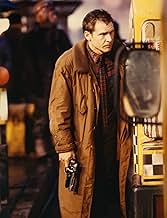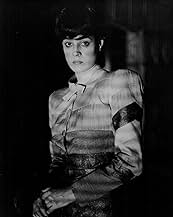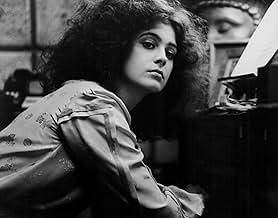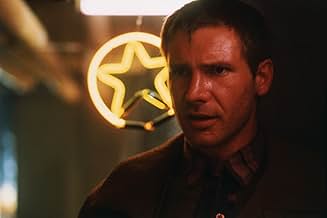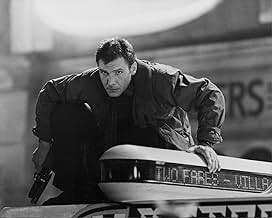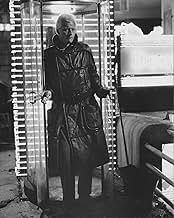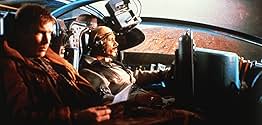Blade Runner
A blade runner must pursue and terminate four replicants who stole a ship in space and have returned to Earth to find their creator.A blade runner must pursue and terminate four replicants who stole a ship in space and have returned to Earth to find their creator.A blade runner must pursue and terminate four replicants who stole a ship in space and have returned to Earth to find their creator.
- Director
- Writers
- Stars
- Nominated for 2 Oscars
- 13 wins & 22 nominations total
Kimiko Hiroshige
- Cambodian Lady
- (as Kimiro Hiroshige)
Bob Okazaki
- Sushi Master
- (as Robert Okazaki)
- Director
- Writers
- All cast & crew
- Production, box office & more at IMDbPro
Summary
Reviewers say 'Blade Runner' is acclaimed for its deep themes, striking visuals, and intricate story, often noting its examination of humanity, identity, and artificial life ethics. Many commend its philosophical richness and immersive world, blending film noir with sci-fi. However, some find the pacing slow and characters underdeveloped. Debate exists over different cuts, with preferences varying between the original and director's cut. The soundtrack and special effects, though innovative, receive mixed reviews, with some considering them dated or mood-dependent.
Featured reviews
Blade Runner, directed by Ridley Scott and based on Philip K. Dick's novel Do Androids Dream of Electric Sheep, is a Sci-fi slash Noir film about a cop named Rick Deckard (Harrison Ford) in a decrepit 2019 Los Angeles whose job it is to "retire" four genetically engineered syborgues, known as "Replicants". The four fugitives, Pris (Daryl Hannah), Zhora (Joanna Cassidy), Leon (Brion James), and their leader, Roy Batty (Rutger Hauer), have escaped from an off-world colony in order to find their creator and bully him into expanding their pre-determined four year life span. This film originally flopped when it came out in 1982, but since has become a widely acclaimed cult classic with a director's cut to boot. A large part of the success that this movie has received can be attributed to its ability to operate on many different levels.
Ridley Scott's hauntingly possible depiction of what might become of Los Angeles down the line is absolutely brilliant. It captures elements of Noir with its urban atmosphere of decadence, lighting, and characters neither clearly defined as good nor evil. Corruption is everywhere. The garbage-littered streets and permanence of dark and rain give us the sense that we've seriously screwed up the atmosphere, and the impression that all respectable human beings have fled to the off-world colonies, leaving only the scum of the earth behind.
There is a hint of style from the 40's, especially with respect to cars, costumes, and music. Rachael's entire outfit, including her hair, screams the 40's.
The soundtrack, arranged by Vangelis (who won an Oscar for his Chariots of Fire score), consisted mainly of Jazz and Blues. This functioned to represent a dark, moody world of uncertainty and pessimism.
The special effects were exceptional. Much of the set was pulled off using models. In my opinion, sets made by hand require leagues more of skill and are much more impressive and realistic than those computer generated. These guys really knew what they were doing. I was especially fond of the pyramidesque Tyrell Corporation building, which hinted at the god-like presence of Eldon Tyrell (Joe Turkell), the creator.
The script (Hampton Fancher, David Peoples, and of course Phil Dick) worked for me, as well as the actors who gave voice to it. Harrison Ford was well...Harrison Ford. I thought he did a tremendous job down-playing the role. His voice-over narration helped you along, and was yet another feature conducive to Film Noir (apparently this was taken out of the Director's Cut). Rutger Hauer's performance was intense. His lines at the end were intriguingly philosophical. Daryl Hannah's chilling robotic expressions were quite impressive. Joanna Cassidy was just plain hot.
There is more to this film than just pulp. It works on so many remarkable levels. The movie itself is a detective noir quest for the meaning of life in a science fiction environment, but the story is a commentary on what it means to be human and the questions each one of us have about life, like: How long have I to live? Why do I have to die? What happens when I die? Doesn't my maker care? Is this all merely an illusion? At the end of the film we are left to wonder if these Replicants are human, and if Deckard himself is in fact a Replicant. Scott raises more questions here than he answers, and as a result, critics are still debating the mysteries of this film today. In a sense, the ambiguity of Blade Runner is the culprit of its success.
Ridley Scott's hauntingly possible depiction of what might become of Los Angeles down the line is absolutely brilliant. It captures elements of Noir with its urban atmosphere of decadence, lighting, and characters neither clearly defined as good nor evil. Corruption is everywhere. The garbage-littered streets and permanence of dark and rain give us the sense that we've seriously screwed up the atmosphere, and the impression that all respectable human beings have fled to the off-world colonies, leaving only the scum of the earth behind.
There is a hint of style from the 40's, especially with respect to cars, costumes, and music. Rachael's entire outfit, including her hair, screams the 40's.
The soundtrack, arranged by Vangelis (who won an Oscar for his Chariots of Fire score), consisted mainly of Jazz and Blues. This functioned to represent a dark, moody world of uncertainty and pessimism.
The special effects were exceptional. Much of the set was pulled off using models. In my opinion, sets made by hand require leagues more of skill and are much more impressive and realistic than those computer generated. These guys really knew what they were doing. I was especially fond of the pyramidesque Tyrell Corporation building, which hinted at the god-like presence of Eldon Tyrell (Joe Turkell), the creator.
The script (Hampton Fancher, David Peoples, and of course Phil Dick) worked for me, as well as the actors who gave voice to it. Harrison Ford was well...Harrison Ford. I thought he did a tremendous job down-playing the role. His voice-over narration helped you along, and was yet another feature conducive to Film Noir (apparently this was taken out of the Director's Cut). Rutger Hauer's performance was intense. His lines at the end were intriguingly philosophical. Daryl Hannah's chilling robotic expressions were quite impressive. Joanna Cassidy was just plain hot.
There is more to this film than just pulp. It works on so many remarkable levels. The movie itself is a detective noir quest for the meaning of life in a science fiction environment, but the story is a commentary on what it means to be human and the questions each one of us have about life, like: How long have I to live? Why do I have to die? What happens when I die? Doesn't my maker care? Is this all merely an illusion? At the end of the film we are left to wonder if these Replicants are human, and if Deckard himself is in fact a Replicant. Scott raises more questions here than he answers, and as a result, critics are still debating the mysteries of this film today. In a sense, the ambiguity of Blade Runner is the culprit of its success.
Just my personal opinion. Everything is perfect about this movie. I saw the movie the first time when I was 12 and it was mind blowing for me. 38 years later I feel the same about this movie. Timeless and beautiful. For me 10/10 with a star and smile
A feast for the eyes. Dark and uncompromising. With a haunting musical score by Vangelis that adds a hypnotic quality to those breathtaking megacity landscapes of future Los Angeles. Ridley Scott's adaptation of Philip K. Dick's post-apocalyptic bounty hunter story 'Do Androids Dream Of Electric Sheep' is a visionary work of art; it's a dystopian masterpiece and I'd personally call it as much a milestone of science fiction as Kubrick's '2001' (and be advised to watch the version known as the "final cut" if you want to catch 'Blade Runner' as it was intended by its director).
It's hard to overstate how influential the film was; it invented the sci-fi subgenre now known as "cyberpunk", and it was also the first "film noir" in a sci-fi setting. And although it looks so distractingly gorgeous that even today there are people who still dismiss it as superficial and mere "eye candy", it is a philosphically deep film that ponders existential questions about the nature of being human. Its slow, brooding quality will perhaps leave some modern audiences who are used to a different pace and more action underwhelmed - but make no mistake: this is a groundbreaking masterwork of its genre and a timeles classic. 10 stars out of 10.
Favorite films: IMDb.com/list/mkjOKvqlSBs/
Lesser-Known Masterpieces: imdb.com/list/ls070242495/
It's hard to overstate how influential the film was; it invented the sci-fi subgenre now known as "cyberpunk", and it was also the first "film noir" in a sci-fi setting. And although it looks so distractingly gorgeous that even today there are people who still dismiss it as superficial and mere "eye candy", it is a philosphically deep film that ponders existential questions about the nature of being human. Its slow, brooding quality will perhaps leave some modern audiences who are used to a different pace and more action underwhelmed - but make no mistake: this is a groundbreaking masterwork of its genre and a timeles classic. 10 stars out of 10.
Favorite films: IMDb.com/list/mkjOKvqlSBs/
Lesser-Known Masterpieces: imdb.com/list/ls070242495/
In the future year of 2019, a group of four replicas arrive on Earth in search of their creator, Blade Runner Rick Deckard is persuaded into hunting them down.
Love it or hate it, one thing that can't be questioned, is the amount of movies that this film inspired. Blade Runner was a ground breaking movie, one that was way ahead of its time.
Blade Runner is up there with Dune for me as one of the greatest movies to come out of the 80's, I would definitely deem it as a classic, it's so watchable.
The best element for me, the visuals, this is one the truly exquisite looking film, consider the era it was made in, and the lack of sophisticated special effects and tech, this is a triumph of creativity.
I know pacing is an issue for some, and storytelling has changed with time, but the pace here is very deliberate, it develops and builds, it's there to give you a sense of unease. Don't expect action at every turn, that's not the purpose of the film.
The music of Vangelis is terrific throughout, it adds to the film, and never imposes or tries to overtake.
I always love seeing someone's vision of the future, and the future world is wonderfully imaginative and perfectly realised, though still wonderfully 1980's, so there's plenty of punk and glam, big hair, clear plastic jackets and eye shadow galore. One thing that was spot on, a greater coming together of cultures.
A recent news article about AI made me think of this film, scientists are warning about the threat posed by AI development, after watching this film again, I can see where they're coming from.
Harrison Ford is great, perfectly cast as Deckard, another of his iconic roles. Rutger Hauer also manages to captivate and terrify.
This is a classic, quality movie.
9/10.
Love it or hate it, one thing that can't be questioned, is the amount of movies that this film inspired. Blade Runner was a ground breaking movie, one that was way ahead of its time.
Blade Runner is up there with Dune for me as one of the greatest movies to come out of the 80's, I would definitely deem it as a classic, it's so watchable.
The best element for me, the visuals, this is one the truly exquisite looking film, consider the era it was made in, and the lack of sophisticated special effects and tech, this is a triumph of creativity.
I know pacing is an issue for some, and storytelling has changed with time, but the pace here is very deliberate, it develops and builds, it's there to give you a sense of unease. Don't expect action at every turn, that's not the purpose of the film.
The music of Vangelis is terrific throughout, it adds to the film, and never imposes or tries to overtake.
I always love seeing someone's vision of the future, and the future world is wonderfully imaginative and perfectly realised, though still wonderfully 1980's, so there's plenty of punk and glam, big hair, clear plastic jackets and eye shadow galore. One thing that was spot on, a greater coming together of cultures.
A recent news article about AI made me think of this film, scientists are warning about the threat posed by AI development, after watching this film again, I can see where they're coming from.
Harrison Ford is great, perfectly cast as Deckard, another of his iconic roles. Rutger Hauer also manages to captivate and terrify.
This is a classic, quality movie.
9/10.
Rick Deckard is given an assignment to 'retire' several biologically engineered fugitives.
The plot follows Deckard as he hunts replicants, falls in love and questions his own humanity. It moves slow, allowing you to take in all the sights and sounds of 2019 Los Angeles (as imagined in 1982), whilst pondering some of its themes.
The imagery and dialogue associated with what defines a sentient being and what makes us human is compellingly portrayed. The device used to explore these themes is the genetically engineered humanoid life-form, the godlike status of its creator and the morally compromised nature of the ordinary human. Additionally the number of references to the eyes and linking of what we see and remember versus what is fake and reality, is cleverly mixed into the story. If you want in depth analysis, google 'Blade Runner Themes and Motifs'.
The character of Roy Batty has been interpreted as both a religious and philosophical allegory, but these theories are debatable. He is for me the most intriguing character in the movie and his final scene is one of the most memorable of all time. Along with Deckard, it made me wonder if there is any real difference between humans and replicants. He is portrayed wonderfully by Rutger Hauer who both looks and acts the part.
Deckard is impressively played by Harrison Ford, who is perfect for movies with an emphasis on visuals. Ninety percent of his power as an actor comes from his screen presence and soulful facial expressions. His scenes with Sean Young young are as touching as the action scenes are brutal.
One of Blade Runner's most memorable aspects is its depiction of 2019 Los Angeles, with its permanently dark rainy skies, overcrowding, neon lights, high concept technology, urban decay and environmental devastation. Take away the flying cars and off-world colonies and it's not far off an accurate prediction.
I could write about the atmospheric cinematography, artistic designs and special effects, but nothing I can say would do it justice.
The question of whether Deckard is replicant or human is interesting. There is evidence of both but you must watch and decide. Does it matter? Probably not. If I had to decide, I'd say replicant.
The plot follows Deckard as he hunts replicants, falls in love and questions his own humanity. It moves slow, allowing you to take in all the sights and sounds of 2019 Los Angeles (as imagined in 1982), whilst pondering some of its themes.
The imagery and dialogue associated with what defines a sentient being and what makes us human is compellingly portrayed. The device used to explore these themes is the genetically engineered humanoid life-form, the godlike status of its creator and the morally compromised nature of the ordinary human. Additionally the number of references to the eyes and linking of what we see and remember versus what is fake and reality, is cleverly mixed into the story. If you want in depth analysis, google 'Blade Runner Themes and Motifs'.
The character of Roy Batty has been interpreted as both a religious and philosophical allegory, but these theories are debatable. He is for me the most intriguing character in the movie and his final scene is one of the most memorable of all time. Along with Deckard, it made me wonder if there is any real difference between humans and replicants. He is portrayed wonderfully by Rutger Hauer who both looks and acts the part.
Deckard is impressively played by Harrison Ford, who is perfect for movies with an emphasis on visuals. Ninety percent of his power as an actor comes from his screen presence and soulful facial expressions. His scenes with Sean Young young are as touching as the action scenes are brutal.
One of Blade Runner's most memorable aspects is its depiction of 2019 Los Angeles, with its permanently dark rainy skies, overcrowding, neon lights, high concept technology, urban decay and environmental devastation. Take away the flying cars and off-world colonies and it's not far off an accurate prediction.
I could write about the atmospheric cinematography, artistic designs and special effects, but nothing I can say would do it justice.
The question of whether Deckard is replicant or human is interesting. There is evidence of both but you must watch and decide. Does it matter? Probably not. If I had to decide, I'd say replicant.
Remembering Rutger Hauer (1944-2019)
Remembering Rutger Hauer (1944-2019)
We celebrate the life and legacy of Rutger Hauer, the award-winning actor best known for Blade Runner and The Hitcher.
Did you know
- TriviaPhilip K. Dick personally approved of Rutger Hauer, describing him as, "the perfect Batty-cold, Aryan, flawless".
- Goofs(at around 9 mins) When we see Deckard waiting for his noodles, he is reading that day's newspaper. Later in Leon's apartment (at around 25 mins), the same newspaper is seen in one of the drawers, except it is old and soiled, as if it has been there for years. We know they are the same since both newspapers have the same headline about farming on the moon.
- Crazy creditsIn the "happy ending" Theatrical/International cuts, the credits play over the gorgeous scenery. In later Director/Final cuts, they play over a normal black background.
- Alternate versionsAll U.S video tape releases before January 1993 are the unrated version and contain the extra violence in the Euro-release that's not seen in the 117 minute American theatrical release:
- When Roy attacks Tyrell we clearly see him pushing his thumbs into Tyrell's eyes, and blood spurting out
- When Pris (Daryl Hannah) attacks Deckard, she reaches down and grabs him by the nostrils
- When Deckard shoots Pris, he shoots 3 times instead of 2
- When Roy pushes the nail through his hand, there is a shot of the nail coming through the skin on the other side.
- ConnectionsEdited into Off the Air: Falling (2012)
- SoundtracksHarps of the Ancient Temples
Composed by Gail Laughton
Performed by Gail Laughton
Courtesy of Laurel Records
Details
- Release date
- Countries of origin
- Official site
- Languages
- Also known as
- Dangerous Days
- Filming locations
- Production companies
- See more company credits at IMDbPro
Box office
- Budget
- $28,000,000 (estimated)
- Gross US & Canada
- $32,914,489
- Opening weekend US & Canada
- $6,150,002
- Jun 27, 1982
- Gross worldwide
- $41,767,218
- Runtime1 hour 57 minutes
- Color
- Sound mix
- Aspect ratio
- 2.39 : 1
Contribute to this page
Suggest an edit or add missing content








